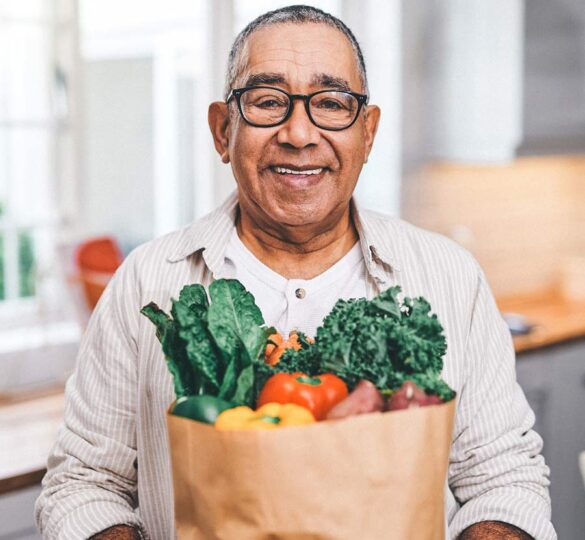Nutrition and Glaucoma
Research indicates that unhealthy lifestyle choices, especially poor dietary habits, can significantly affect health. Maintaining proper nutrition can help prevent and slow the progress of some health conditions.

New diet trends promising to improve your health come and go, often gaining popularity through social media and celebrity endorsements until new fads take their place. Some are fads with little to no scientific backing, while others are credible. What’s trendy one day — keto, intermittent fasting, or paleo — may quickly be replaced by the next big diet craze, highlighting the importance of proven, reputable nutrition guidelines in protecting your health.
Research indicates that unhealthy lifestyle choices, especially poor dietary habits, can significantly affect health. Maintaining proper nutrition can help prevent and slow the progress of certain health conditions.
If you or a loved one has been diagnosed with glaucoma, you may wonder if diet plays a role in managing this condition. While a balanced diet cannot cure glaucoma, certain foods and nutrients actively support better eye pressure regulation, improve blood flow to the optic nerve, and reduce oxidative stress — crucial factors in managing glaucoma.
Keep reading to learn more about the connection between nutrition and glaucoma, the best foods to include in your diet, and those you may want to avoid or limit. Whether you’re looking for simple dietary changes or specific nutrients that benefit eye health, this article will provide practical tips to help you make informed choices. Taking control of your nutrition is one more way to support your vision and overall well-being.
Dig In (Good Food Choices for People With Glaucoma)
Go Green
Eating leafy greens is widely recognized as essential for maintaining overall health — but their benefits may extend even further for those concerned about glaucoma. Research suggests that individuals who regularly consume leafy greens such as kale and spinach may have a 20% to 30% lower risk of developing the condition. While the study doesn’t confirm a direct cause-and-effect relationship, it does highlight a strong association.
Leafy greens are also known for reducing inflammation and lowering the risk of cancer, heart disease, and macular degeneration. In other words, adding more greens to your plate is a simple, delicious choice with plenty of potential upsides.
Get Fruity
Bananas, avocados, pumpkin seeds, and black beans are excellent sources of magnesium, helping you reach the recommended daily intake of 300-400 mg. While more research is needed, early studies indicate that dietary magnesium may support people with glaucoma by enhancing blood flow to the eyes. It may also help protect retinal ganglion cells — key players in processing visual information and sending it to the brain through the optic nerve.
Go Nuts
Nuts and seeds are excellent sources of vitamin E, which helps maintain cell health and protects retinal tissues from free radical damage. Incorporating almonds, hazelnuts, and sunflower seeds into your diet can benefit your eye health.
Go Fish
There’s no catch — fish like salmon, tuna, sardines, and halibut are rich in omega-3 fatty acids, which studies suggest may lower the risk of developing eye diseases as you age. Plus, studies link a diet higher in omega-3s to reduced eye pressure related to glaucoma.
It’s Tea Time
A study published in the British Journal of Ophthalmology found that individuals who drank at least one cup of hot tea each day had a 74% lower risk of being diagnosed with glaucoma than those who didn’t drink tea. While more research is needed to understand the connection entirely, it seems the Brits may have been onto something all along!
Dig Into Chocolate
Great news for chocolate fans! According to research published by the National Institutes of Health, adults who ate a bar of dark chocolate experienced slightly improved vision about two hours later. The likely reason? Flavanols are antioxidants in dark chocolate that may boost blood flow. Sure, the improvement was slight, but still — chocolate for better eyesight? We’ll take it!
On the Other Hand (Foods to Avoid or Use in Moderation if You Have Glaucoma)
Caffeine
While moderate caffeine consumption is generally safe, excessive intake may elevate intraocular pressure, particularly in individuals predisposed to high eye pressure. Limiting caffeine intake is advisable for glaucoma patients.
Alcohol
Although alcohol can temporarily lower eye pressure, regular drinking has been associated with higher intraocular pressure. Most glaucoma specialists recommend practicing moderation.
Supplements and Herbal Remedies
Currently, there is no convincing data that herbal medicines or nutritional supplements, such as vitamins, help to prevent glaucoma. Patients should consult their ophthalmologist before beginning any supplement regimen, as excessive intake of certain herbs, vitamins, or minerals can result in serious health problems.
Help Us Find a Cure
Although nutrition alone cannot prevent or cure glaucoma, a diet rich in specific nutrients may support eye health and complement traditional treatments. Patients should consult their healthcare providers before making significant dietary changes or starting new supplements to ensure personalized and safe care.
While there is no cure for glaucoma, advancements in research continue to bring us closer to finding one and restoring vision loss. You can help find a cure by donating cash, stock, or a vehicle. Your support will give hope to those living with glaucoma and accelerate our search for a cure and vision restoration.
The tireless work of researchers continues to improve our understanding of glaucoma daily. As a result, there is great hope for new and improved treatments, including innovative drug delivery methods, laser treatments, and less invasive surgical techniques. You can help make that happen!
Last updated on April 15, 2025. Article reviewed for medical accuracy by Ruth Williams, MD.

Ruth Williams, MD
Ruth D. Williams, MD is a glaucoma specialist at the Wheaton Eye Clinic in Wheaton, Illinois. She is a past president of the American Academy of Ophthalmology and a national spokesperson on ophthalmic issues.